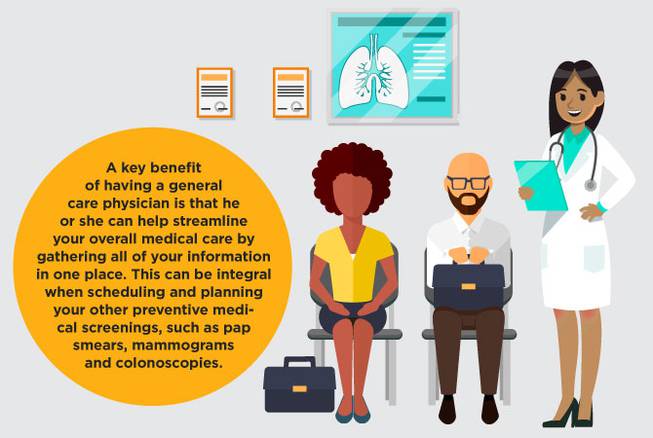
Monday, Nov. 13, 2017 | 2 a.m.
Meet the medical professionals in this story
• Kee No, MD, internal medicine physician at Caremore Medical Group • Sorahi Toloyan-Rahimi, MD, family medicine physician at MountainView Medical Associates
Many people wait until they’re sick to see a doctor, but committing to an annual checkup routine is important for all adults, especially those 50 and older. While there’s been some controversy in recent years about the effectiveness of an annual, there are ways to maximize your doctor’s visit to ensure you’re getting the most out of the experience.
“An annual doctor’s appointment functions primarily as a preventive care measure. They give the physicians an opportunity to identify risk factors for chronic diseases,” said Kee No, MD.
Many health care insurers require an annual checkup for this reason: Preventing illness from forming, or escalating, generally makes it much easier to manage than treating it once it’s in an advanced state.
“Annual exams allow us to stay on top of individual health,” said Sorahi Toloyan-Rahimi, MD. Doctors say everyone should treat their annual checkup as an instrumental tool in their health care regimen.
The purpose of an annual checkup
An annual checkup gives your doctor the chance to update important information, order lab results and go over any concerns you may have. Everyone’s body is different and as such, the standard for good health can vary between individuals. The clinical information gathered during annual checkups helps your doctor establish a benchmark understanding of what your personal health looks like.
Any changes or deviations from typical trends observed in your health portfolio year-over-year may mean further testing is required to find the source of these changes. This is one of the ways an annual checkup can contribute to disease prevention — and it’s why you shouldn’t miss your yearly appointment.
“Regular checkups allow for the production of a more complete and extensive medical history, which is crucial for monitoring patient health,” No said. “A substantial body of clinical data provides a point-comparison for the patient when they have concerns.”
Similarly, Toloyan-Rahimi stresses the importance of overviewing any health-related events that may have occurred over the past 12 months, including changes in family history and changes in your physical and emotional health.
What to expect during an annual
Generally, annual checkups are fairly standardized and will include the same tests every year, unless there’s a reason to order additional tests.
Your doctor will ask you a few questions about lifestyle changes, family history and medical events that have occurred since your last visit. He or she will make sure you’re up to date on vaccinations, check your weight, cholesterol and blood pressure, and review your risk factors for cancer and other diseases.
If you’re managing a chronic disease — such as diabetes — your doctor will evaluate the status of your disease and make sure there aren’t any concerning developments.
When necessary, your doctor will also help guide important lifestyle modifications. “Your doctor should cover all age-appropriate preventive care options, including diet, exercise, safe sex, self-breast exams, self-skin exams, drug/alcohol abuse, depression and risks for falls for the elderly,” Toloyan-Rahimi said.
General well-being counseling is also offered, including “smoking cessation, obesity/weight-loss planning and behavioral health,” No said.
How to prepare for your exam
Taking the time to prepare for your annual checkup can ensure that you’re reaping the full benefits of the exam.
1. Make a list of any changes that have occurred over the past 12 months. “In general, you should prepare to update your doctor with any changes since the last visit, including medication changes and/or hospitalizations,” No said.
2. Make sure your medical records are up to date and that your general physician has all documentation from your other doctors/specialists. “Bring any records you have from other physicians and a full list of medications you’re taking,” Toloyan-Rahimi said. Don’t forget to include over-the-counter medications, vitamins and supplements.
3. Make a list of any health concerns and/or questions to discuss with your physician. Evaluate how you’ve been feeling the past 12 months: Have you been fatigued? Stressed? Sleeping more or less? Gained or lost weight? Noticed a new mole? Experienced any substantial life event that has affected your well-being? Sit down prior to your appointment and think about how you have been feeling lately, and jot down anything about which you might want a doctor’s guidance.
After your exam
Go over your results with your doctor and ask questions if you have any. Toloyan-Rahimi recommends asking what needs to be done for preventive care going forward. You can also ask your doctor to help you create an action plan, depending your health care goals.
A key benefit of having a general care physician is that he or she can help streamline your overall medical care by gathering all of your information in one place. This can be integral when scheduling and planning your other preventive medical screenings, such as pap smears, mammograms and colonoscopies.

Join the Discussion:
Check this out for a full explanation of our conversion to the LiveFyre commenting system and instructions on how to sign up for an account.
Full comments policy